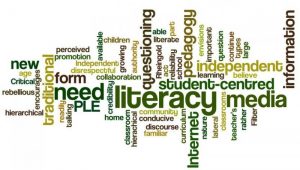Community media mainly focus on (critical) media literacy as one of the most important pillars of education for 21st century.
One of the most basic definitions of the term and most often cited in English literature is a sentence hammered out by participants at the 1992 Aspen Media Literacy Leadership Institute:
Media literacy is the ability to access, analyze, evaluate and create media in a variety of forms.
Definitions, however, evolve over time and a more robust definition is now needed to situate media literacy in the context of its importance for the education of students in a 21st century media culture. Community media therefore use an expanded definition, based on an approach by the Center for Media Literacy (CML, medialit.org):
- (Critical) Media Literacy is a 21st century approach to education.
- (Critical) Media Literacy is as important as literacy itself in the 21st century.
- (Critical) Media Literacy provides a framework to access, analyze, evaluate and create messages in a variety of forms - from print to video to the Internet.
- (Critical) Media literacy builds an understanding of the role of media in society as well as essential skills of inquiry and self-expression necessary for citizens of a democracy.
What is important to understand is that media literacy is not just about "protecting" people from unwanted messages or false information. Although some groups urge families to just turn the TV off, the fact is, media are so ingrained in our cultural milieu that even if you turn off the set, you still cannot escape today's media culture. Media no longer just influence our culture. They ARE our culture.
Media literacy, therefore, is about helping people become competent, critical and literate in all media forms so that they control the interpretation of what they see or hear rather than letting the interpretation control them.
To become media literate is not to memorize facts or statistics about the media, but rather to learn to raise the right questions about what you are watching, reading or listening to.
Media Literacy education is about more than just teaching people how to use modern media. Without this fundamental ability, an individual cannot have full dignity as a human person or exercise citizenship in a democratic society where to be a citizen is to both understand and contribute to the debates of the time.

READ ON: MEDIA LITERACY
[EN] CML – The Center for Media Literacy
[EN] MLN – Media Literacy NOW!
[EN] EAVI – NGO working for citizens empowerment (in media)
[EN] What is Media Literacy and why is it important? (commonsensemedia.org)
[DE] Medienkompetenz und "critical media literacy" (Vorlesung)
[DE] Was ist Medienkompetenz (Dieter Baacke)
[ES] UNESCO - Alfabetización Mediática e informacional
[ES] UNESCO - Las 5 leyes de la alfabetización mediática
[ES] CONCEPTO - Ciudadanía digital
[ES] AULA PLANETA - Vídeos para trabajar la alfabetización mediática
